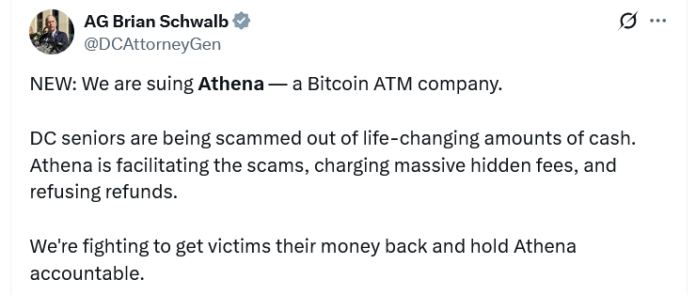The Washington, D.C. attorney general’s office has filed a lawsuit against Athena Bitcoin, a crypto ATM operator, alleging that the company failed to disclose fees to its customers and did not have sufficient anti-fraud safeguards in place. According to the lawsuit, 93% of deposits made on Athena’s machines in its first five months of operation were linked to scams, with the company profiting from these transactions through undisclosed fees.
DC Attorney General Brian Schwalb criticized Athena’s no-refund policy, which he claims is preventing victims of scams from recovering their losses. Schwalb stated that “Athena knows that its machines are being used primarily by scammers yet chooses to look the other way so that it can continue to pocket sizable hidden transaction fees.” The lawsuit alleges that Athena charged consumers fees of up to 26% per transaction without clearly disclosing them, and that the company misled users by referring to a “Transaction Service Margin” in its terms of service without mentioning the word “fee”.
Allegations of Deceptive Practices
The attorney general’s office claims that Athena engaged in deceptive and unfair trade practices, and that the company violated laws aimed at protecting vulnerable adults and the elderly from abuse, neglect, and financial exploitation. According to the lawsuit, Athena “pocketed hundreds of thousands of dollars in undisclosed fees” from scam victims, many of whom were elderly or vulnerable, in its first five months of operating in D.C. The median age of victims was 71, and the median loss per transaction was $8,000.
Schwalb’s office also claimed that Athena had “ineffective oversight,” which created an “unchecked pipeline for illicit international fraud transactions.” The lawsuit alleges that Athena permitted and profited from transactions in which victims were coerced, misled, and manipulated into depositing their life savings into Athena’s machines under fraudulent pretenses. One D.C. resident allegedly lost $98,000 from a scam facilitated at an Athena kiosk.
Steps to Avoid Being Scammed at Crypto ATMs
To protect themselves from scams, crypto ATM users should be cautious when sending funds to someone they haven’t met, especially if it’s to someone they’ve been randomly contacted by. Scammers often present themselves as crypto tech support specialists or traders who promise to help victims make outsized profits at little to no risk. Users should refrain from responding to random requests and instead contact the institution or person the scammer claims to represent through official channels.
There are currently 26,850 crypto ATMs in the US, according to CoinATMRadar, with Bitcoin Depot owning the largest share of machines at 27.6%, followed by CoinFlip and Athena at 13.6% and 13%, respectively. The FBI has reported nearly 11,000 complaints of fraud related to crypto ATMs in 2024, totaling over $246 million in losses. At least 13 states have implemented transaction limits to reduce the potential impact of crypto ATM fraud.
Industry-Wide Issue of Undisclosed Fees
The issue of undisclosed fees is not unique to the crypto industry, as the banking industry has also faced numerous scandals related to hidden fees. In April, the Federal Deposit Insurance Corporation ordered Discover Bank to return around $1.2 billion in fees it overcharged to customers. Wells Fargo was ordered to pay $3.7 billion in fines in December 2022 for imposing illegal fees and interest charges on mortgages. Bank of America was also ordered to pay over $250 million for charging “junk fees” in 2023.
Source: Brian Schwalb
Share of crypto ATMs by operator in the US. Source: CoinATMRadar
Athena did not immediately respond to a request for comment. The lawsuit against Athena Bitcoin is part of a broader crackdown on crypto ATMs, with regulators and law enforcement agencies seeking to reduce the risk of fraud and protect consumers. For more information, visit the original source.

